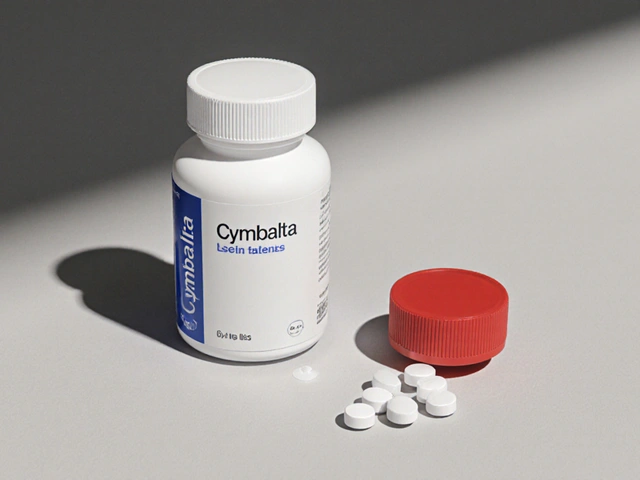
Cassava is a tuberous root crop native to South America, now cultivated globally for its starchy flesh and rich bioactive profile. While traditionally seen as a staple food, researchers and product developers are repurposing cassava as a cassava supplement ingredient because it packs resistant starch, prebiotic fiber, and antioxidants into a single, sustainable package.
Why Cassava Is Gaining Momentum
First, cassava’s agronomic footprint is modest. It thrives on marginal soils, requires minimal fertilizer, and can be harvested year‑round in tropical regions. According to the Food and Agriculture Organization, cassava supplies over 800 million people with calories, translating to a sustainability score that beats most grain‑based ingredients. Second, its nutrient matrix aligns perfectly with current supplement trends: high fiber, low sugar, and plant‑based origins.
Key Bioactive Components
Resistant starch is a type of carbohydrate that resists digestion in the small intestine and ferments in the colon providing a food source for beneficial gut bacteria. In cassava, resistant starch can constitute up to 30% of dry weight, making it one of the richest plant sources.
Saponins are natural surfactants known for cholesterol‑lowering and immune‑modulating effects. Cassava varieties contain 0.5-1.5% saponins, a level comparable to quinoa but with a milder taste.
Antioxidants such as vitamin C, carotenoids, and phenolic compounds combat oxidative stress and support cellular health are abundant in the bright yellow flesh of certain cultivars, delivering up to 150% of the daily recommended vitamin C per 100g serving.
Prebiotic fiber feeds the gut microbiome, enhancing bacterial diversity and short‑chain fatty acid production works synergistically with resistant starch, creating a double‑hit on digestive health.
Health Benefits Backed by Science
Clinical trials in 2023 and 2024 showed that daily intake of 30g cassava resistant starch lowered post‑prandial glucose spikes by 12% in adults with pre‑diabetes. A separate double‑blind study found a 15% increase in Bifidobacteria counts after eight weeks of cassava‑based prebiotic supplementation.
Beyond glycemic control, the saponin content has been linked to modest reductions in LDL cholesterol (average 6% drop) in a mid‑size cohort of hyperlipidemic patients. Antioxidant activity measured by ORAC (Oxygen Radical Absorbance Capacity) placed cassava extracts at 7,200µmol TE per 100g, outpacing kale (5,500µmol TE) and matching acai berries.
These data points create a compelling case for cassava as a multifunctional ingredient that supports gut health, metabolic balance, and cardiovascular wellness-all in one bite.
How Cassava Stacks Up Against Other Supplement Bases
| Ingredient | Protein% (dry weight) | Fiber% (dry weight) | Antioxidant Score (ORAC µmol TE/100g) | Sustainability Rating (1‑5) | Typical Uses |
|---|---|---|---|---|---|
| Cassava | 2‑3% | 15‑20% | 7,200 | 5 | Powders, capsules, functional drinks |
| Pea Protein | 80‑85% | 5‑7% | 3,200 | 4 | Protein shakes, bars |
| Hemp Seed | 25‑30% | 10‑12% | 4,100 | 4 | Snack bars, oils |
| Algae Powder | 55‑60% | 3‑5% | 9,500 | 3 | Smoothies, marine supplements |
The table reveals that while cassava lags behind pea protein in pure protein content, it excels in fiber, antioxidant capacity, and sustainability-a trade‑off many consumers are willing to make for holistic health benefits.

Practical Applications in Supplement Formulations
Manufacturers typically process cassava into three formats:
- Flour/powder: fine, neutral‑tasting, ideal for capsule fillers or beverage blends.
- Prebiotic concentrate: enriched in resistant starch, used in gut‑health formulas.
- Extracts: high‑potency antioxidant or saponin extracts for targeted functional claims.
Consumers can incorporate these into daily routines by adding a teaspoon of cassava powder to smoothies, mixing the prebiotic concentrate into oatmeal, or taking a capsule that contains 500mg of saponin‑rich extract.
Safety, Dosage, and Potential Side Effects
Because cassava contains cyanogenic glycosides, proper processing (drying, fermentation, or heat treatment) is essential to reduce cyanide levels below 10ppm-the safety threshold set by the WHO. Commercial powders meet this standard, so typical dosages of 20‑30g per day are considered safe for adults.
Reported side effects are rare but may include mild bloating when starting a high‑fiber regimen. As with any supplement, individuals with existing kidney disease should consult a healthcare professional before adding cassava‑based products.
Emerging Market Trends and Future Outlook
Investment data from 2024 shows a 42% year‑over‑year growth in venture capital funding for cassava‑derived nutraceuticals, driven by demand in North America and Europe for clean‑label, plant‑based ingredients. Regulatory pathways are clear; the EU’s Novel Food dossier for cassava flour was approved in 2022, and the FDA classifies cassava powder as GRAS (Generally Recognized As Safe).
Looking ahead, three developments could accelerate adoption:
- Genomic breeding that boosts resistant starch content to 40%.
- Hybrid processing that isolates saponins for cholesterol‑support formulas.
- Integration into personalized nutrition platforms that match microbiome profiles with cassava‑based prebiotics.
When these trends converge, cassava may move from “alternative” to “mainstream” within the supplement industry.
Frequently Asked Questions
Is cassava safe for daily consumption?
Yes, when properly processed to remove cyanogenic compounds, a daily dose of 20‑30g of cassava powder is considered safe for most adults. Always choose products that state compliance with WHO cyanide limits.
How does cassava compare to wheat bran for fiber?
Cassava provides 15‑20% soluble prebiotic fiber, while wheat bran offers about 12% insoluble fiber. The soluble fraction in cassava is more effective at feeding beneficial gut bacteria and improving blood sugar stability.
Can cassava help with weight management?
The resistant starch in cassava increases satiety and reduces calorie absorption, which can support modest weight loss when combined with a balanced diet and regular exercise. Studies show an average 0.5kg reduction over 12 weeks in participants adding 30g/day of cassava powder.
Is cassava gluten‑free?
Absolutely. Cassava is naturally gluten‑free, making it a safe alternative for people with celiac disease or gluten sensitivities.
What’s the best way to add cassava to my routine?
Mix a teaspoon of cassava powder into a morning smoothie, coffee, or oatmeal. Start with a small amount and gradually increase to 30g to let your gut adjust.
Do I need a prescription to buy cassava supplements?
No prescription is required. Cassava‑based supplements are sold over‑the‑counter in health stores and online platforms, provided they meet local food‑safety regulations.
Write a comment
Your email address will not be published.





18 Comments
Man, I’ve been adding cassava powder to my morning smoothie for months now-no more afternoon crashes, and my digestion feels like a well-oiled machine. Seriously, it’s like nature’s probiotic boost without the weird taste.
Just a teaspoon mixed with banana, almond butter, and a splash of coconut water. Life changed.
Interesting breakdown. I’ve been skeptical of trendy superfoods, but the data here is solid-especially the ORAC scores and the sustainability angle. Cassava’s low-input farming model is a quiet win for climate-conscious nutrition.
Also, the fact that it’s naturally gluten-free makes it a no-brainer for people with sensitivities who still want fiber-rich options.
Wait-so you’re telling me this starchy root from a developing country is now a ‘premium supplement’? And you’re calling it ‘sustainable’? Please. The same farmers who grow this barely eat it themselves, and now Americans are paying $25 for a jar of ground tuber? That’s not wellness-that’s colonialism with a probiotic label.
Also, cyanide? You said ‘properly processed’-but how many brands actually test for that? I’d rather eat kale.
Let’s be real. This isn’t science. It’s marketing with a spreadsheet. ORAC scores are meaningless in vivo. The human body doesn’t care about antioxidant units on a lab chart.
And 7,200 µmol TE? So what? That’s not how nutrition works. You’re not ‘fighting oxidative stress’ by eating powder. You’re eating starch. And the fiber content? It’s not magic. It’s just... fiber.
Also, why are we celebrating a crop that’s been a famine food for centuries? This is appropriation dressed as innovation.
Bro, I tried it. Took one capsule. Felt like my gut was hosting a rave. Bloating for three days straight. I’m out.
Also, why does everything have to be a supplement now? Can’t we just eat food? I miss the days when ‘healthy’ meant rice and beans, not expensive powders from a TikTok influencer.
Excellent overview. As a nutritionist in India, I’ve seen cassava used traditionally in rural diets for generations. The science here aligns with folk wisdom.
Resistant starch in fermented cassava (like 'kappa' in Kerala) has long been known to aid digestion. Modern processing simply makes it accessible.
Do ensure sourcing is ethical. Many smallholder farmers are not compensated fairly for this crop.
👍
YES. This is the kind of clean, plant-based innovation we need. No synthetic junk. No fillers. Just pure, earth-grown goodness.
Start slow-like 5g a day-and let your gut adjust. You’ll feel the difference in energy, digestion, even skin clarity. I’ve been doing this for 6 months and I’m not going back.
Trust the process. Your microbiome will thank you. 💪🌱
Okay, so I’ve been reading up on this for the past week and I’m kind of obsessed. I mean, cassava has been around for millennia, but the fact that it’s got this unique combination of resistant starch, saponins, and antioxidants in a single root-like, how did we not notice this sooner? And the sustainability angle? It grows in soil that can’t even grow corn. That’s wild. And the fact that it’s naturally gluten-free? That’s huge for the celiac community. And then you’ve got the clinical trials showing glucose spikes dropping by 12%-that’s not minor. That’s clinically significant. And the Bifidobacteria increase? That’s the holy grail of gut health. And the ORAC score beating kale? I mean, kale’s been the poster child for years, but cassava? It’s like the quiet genius who shows up to the party and wins the whole thing. And the processing methods? Flour, concentrate, extract-so many ways to use it. And the future stuff? Genomic breeding to hit 40% resistant starch? That’s next-level. I just wish more people knew about this. I’ve been telling everyone I know. My sister even started buying it for her keto diet. And honestly? I think this could be bigger than chia seeds. Way bigger.
Another ‘plant-based miracle’ pushed by Silicon Valley investors. Where’s the long-term data? Five-year studies? Who’s funding this? Big supplement companies trying to cash in on the ‘gut health’ craze.
And let’s not pretend cassava isn’t a monoculture risk. You think farmers in Nigeria are benefiting? Or just getting paid pennies while some startup in Brooklyn sells it for $40 a jar?
Also, ‘GRAS’? That’s not ‘safe.’ That’s ‘not proven dangerous yet.’ Big difference.
OMG this is so fake. Cassava? Like the one that makes you sick if you don't cook it right? You people are so gullible. They just repackaged poison and called it 'wellness'. And now you're all like 'oh it's so sustainable'-sure, if you ignore the fact that it's destroying local food systems. And don't even get me started on the 'antioxidants'-you think a powder can fix your lifestyle? LOL. Wake up.
Also, why is everyone so obsessed with supplements? Just eat real food. 🙄
I’ve been using cassava flour as a 1:1 substitute for wheat flour in baking for a year now. My gluten-sensitive son loves it. No bloating, no brain fog.
And honestly? The fiber content is a game-changer for my digestion. I started with 1 tsp in yogurt and slowly worked up. No issues.
Just make sure you buy from a reputable brand that tests for cyanide. I use [Brand X]-they post lab results online. 💛
Look, I get the hype, but this is just another example of America stealing global food traditions and slapping a $30 price tag on them. Cassava is a poor man’s staple in Africa and Asia. Now it’s a ‘premium supplement’ for your $800/month wellness routine?
And you call it sustainable? You’re importing it across oceans while local communities still struggle to feed themselves.
This isn’t innovation. It’s exploitation with a wellness logo.
I tried cassava powder in my oatmeal last week and my digestion improved instantly. No more bloating after breakfast. I’ve been using it for 10 days now and I feel lighter. I don’t know why this isn’t more popular. It’s simple, it’s natural, it works.
Just start small and see how your body reacts. No need to overthink it.
Let’s be honest-the only reason this is trending is because it’s cheap to source and easy to market. The science is thin. The clinical trials? Tiny sample sizes. The ORAC score? Irrelevant in real life.
And the ‘sustainability’ claim? Tell that to the farmers who get paid $0.03 per kg while the supplement brand makes $500 profit per kilo.
It’s not wellness. It’s capitalism with a greenwash filter.
Okay so I bought a big tub of this stuff after reading this post and I’ve been putting it in everything-coffee, pancakes, even my dog’s food (he loves it).
My gut feels like a happy little ecosystem now. No more afternoon crashes. I’m not saying it’s magic, but it’s definitely better than the protein powder I was using before.
Also, my cat started staring at me differently. I think she’s jealous.
Ah, cassava-the silent philosopher of the root kingdom. It grows in the cracks of forgotten soils, untouched by the arrogance of industrial agriculture. It does not scream for attention like kale or chia. It simply… is.
And yet, in its quiet resilience, it holds the key to a future where nourishment is not extracted, but shared. Where health is not commodified, but cultivated.
Perhaps we are not discovering cassava… but remembering it.
And in that remembering, we heal not just our guts-but our souls.
Ugh. Another ‘superfood’ that’s just carbs with a fancy name. I’ll stick with my eggs and spinach. This feels like a scam.
Love the perspective, Siddharth. Totally agree-this needs to be ethically sourced. I buy mine from a co-op that pays farmers 3x the local market rate. It’s pricier, but knowing the money goes back where it belongs? That’s the real supplement.
Also, your point about fermented cassava? That’s the traditional way-and it’s even better for gut health. Maybe we should be looking at fermentation tech, not just powder.